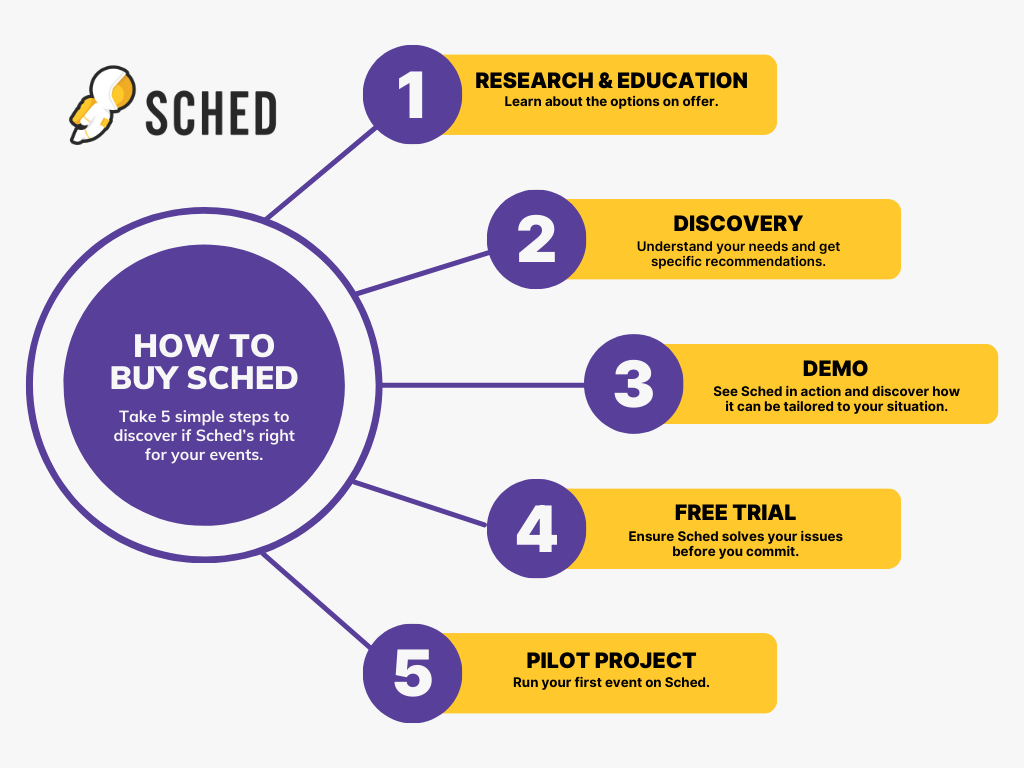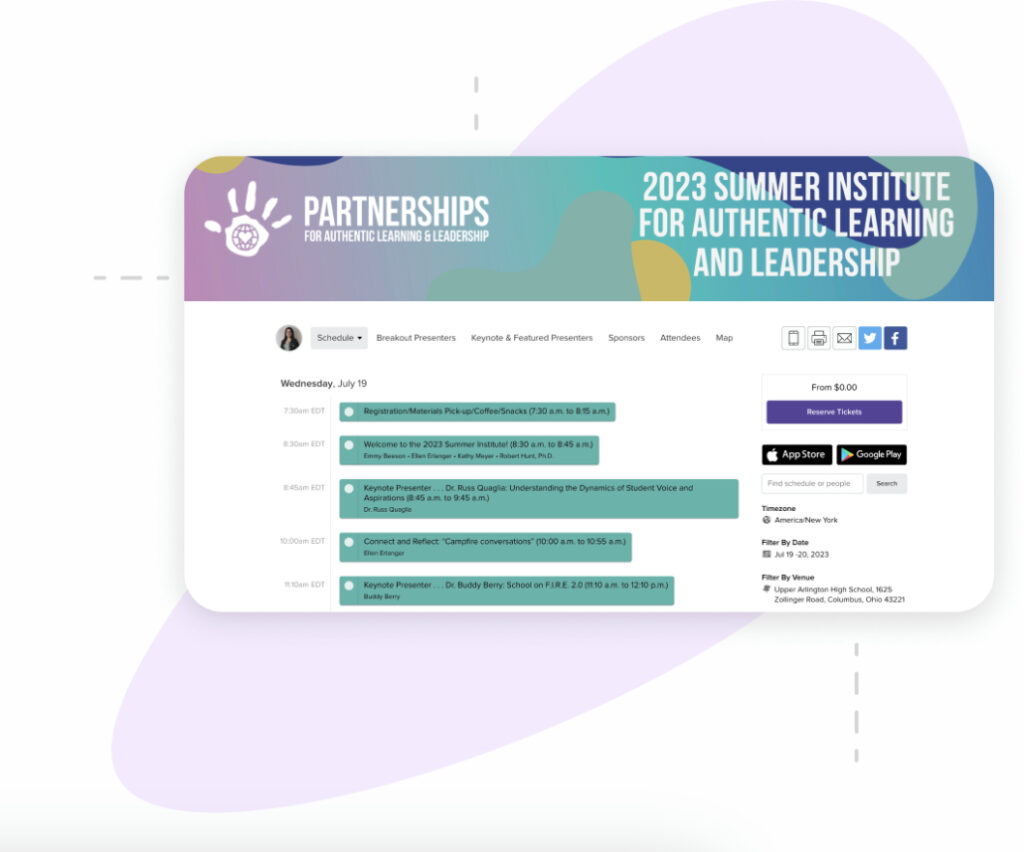AT A GLANCE: Event planner software and the purchasing process
- Define your event management needs and goals before starting the purchasing process.
- Research and evaluate different software vendors, considering their reputation, experience, and customer support.
- Request demos or trials to get a hands-on experience with the software’s functionality and user experience.
- Consider scalability to ensure that the software can accommodate your future needs.
- Pay attention to data security and privacy measures to protect attendee information.
- Gather feedback and reviews from existing users to gain insights.
- Develop an implementation plan and provide training and support to onboard your team effectively.
Organizing events can be a complex and demanding task. They require careful planning, coordination, and attention to detail. To streamline the event management process, many organizations turn to event planner software. However, with so many options in the market, choosing the right software can be a scary task.
In this article, we will guide you through the process of purchasing event planner software. We will explore the key factors to consider, best practices to follow, and common pitfalls to avoid. By understanding the importance of this process, you’ll find the perfect event management software for you.
Assessing your event planner software needs: identifying your requirements and goals
The first step in purchasing event planner software is to assess your event management needs. This involves identifying the specific requirements and goals you have for your events. Consider the type, size, complexity, and logistics, and the unique functionalities of your events.
By clearly defining your needs and goals, you can narrow down your search for event planner software. This will ensure that you invest in a solution that aligns with your event management objectives and helps you achieve success.
- N.B. Learn how to set the right goals for your event in our super easy guide.
Researching and evaluating event planner software vendors
Once you have identified your needs, it is time to research and evaluate different event management software vendors. This involves conducting thorough research by comparing different vendors.
Consider factors like reputation, experience, customer support, pricing models, and user feedback.
- P.S. To see what a comprehensive and yet concise software products comparison looks like, check out our buyers’ guide to Sched V Airmeet.
Consider requesting demos or trials of the software to get a hands-on experience of its functionality. This will allow you to assess whether the software is intuitive and user-friendly for your team.
Bonus Advice: Read our 10 must-ask questions when buying event planner software.
Defining your budget and cost considerations for software purchase

Budget is a crucial factor to consider when purchasing event planner software. Define your budget and determine how much you are willing to invest in a software solution. Consider both the upfront costs and any ongoing costs. This could be subscription fees or additional charges for support or training.
It is important to strike a balance between your budget and the features and functionalities you require. It may be tempting to opt for the cheapest solution available. However, it is essential to ensure that the software meets your specific needs!
Because, after all, looking after your budget – in all walks of life – is crucial. So, to help you out, we’ve made a handy and concise guide to the hidden costs of event management apps and how to avoid them!
Requesting demos and trials: hands-on experience with event planner software functionality
One of the best ways to evaluate event planner software is by requesting trials from different vendors. This allows you to get hands-on experience with the software’s and assess whether it meets your specific requirements.
During demos or trials, pay attention to the user interface, ease of use, customization options, and overall user experience. Evaluate how intuitive and user-friendly the software is. This will impact the efficiency and productivity of your event planner process.
You can claim a free demo of Sched. You can join the weekly live demo or watch the on-demand demos at your leisure.
Additionally, take note of the vendor’s customer support during the demo or trial period. Helpful customer support is crucial when you require assistance during your event planning.
- And on that note, take a minute and try Sched for free!
Examining key features and functionality: what to look for in event management software
When evaluating event planner software, it is essential to consider the functionality it offers. Here are some important features to look for:
- Event Registration and Ticketing: The software should offer robust event registration and ticketing capabilities. Look for customized registration forms, ticket sale management, and data collection.
- Event Website Builder: You want the ability to build professional event websites. This will include customizable templates, branding options, and SEO optimization features.
- Attendee Engagement Tools: Consider whether it has interactive features. Things like networking capabilities, live polling, Q&A sessions, and gamification elements.
- Event Analytics and Reporting: The software should provide comprehensive analytics and reporting features. These will allow you to track key event metrics, and measure attendee engagement, and event performance in real time.
- Integration and Compatibility: Ensure the software integrates with other event tools and systems.
N.B. Okay, you’ve heard all of the awesome benefits. Now, you’re ready to hear about the negative issues if you make the wrong choice. In short, how to Avoid Chaos: the consequences of poor event communication systems.
How to Assess if Sched Is Right for My Event from Sched Support on Vimeo.
Considering user experience and interface: is the event planner software intuitive and user-friendly?
User experience and interface play a crucial role in the efficiency of event planner software. The software should be intuitive and user-friendly. This allows your team to use its features without extensive technical knowledge.
Consider factors such as the cleanliness of the software’s interface. The accessibility of main features and functionalities, and ease of navigation.
Customer feedback is insightful into the user experience of the software. Look for reviews that highlight the software’s ease of use and user-friendliness.
For example, here’s a testimonial from Jesuit High School. They loved how intuitive and user-friendly they found their experience with Sched!
Integration and compatibility: ensuring seamless integration with existing systems
Integration and compatibility are crucial considerations when selecting event planner software. Ensure that the software integrates seamlessly with your existing tools to streamline your event management.
Ask whether it integrates with popular CRM systems, ticketing platforms, or payment gateways. Seamless integration minimizes manual data entry, reduces errors, and enhances overall efficiency.
Additionally, consider whether the software offers compatibility across multiple devices and operating systems. This ensures that your attendees can have a consistent experience.
- P.S. See how easy it is to embed Sched in your site!
Assessing customer support and training resources: ensuring ongoing assistance
Customer support and training resources are essential considerations when selecting event planner software. A responsive and knowledgeable support team can provide timely assistance. This means you can be sure to resolve any issues that may arise during your event.
Consider the support channels available, such as phone, email, or live chat. Assess whether the software offers 24/7 customer support or specific support hours. Look for comprehensive documentation, FAQs, or video tutorials that provide self-help resources.
Additionally, consider training resources or onboarding sessions to ensure a smooth implementation.
For example, with Sched’s premium plan, you can have around-the-clock support, detailed onboarding, and live support.
Scalability and future needs: choosing an event planner software solution that grows with you
Scalability is an important factor to consider when choosing event planner software. You need a software solution that can accommodate your current needs and scale as your event program expands.
Ask whether the software can handle multiple events simultaneously without performance issues. Assess whether it can accommodate a growing number of attendees, registrations, and data.
Choosing scalable software ensures that you can manage multiple events and accommodate future growth.
And on that point, see Sched’s latest features and how we are constantly making our products bigger and better as we go!
Evaluating security and data privacy measures: protecting attendee information
Data security and privacy are critical considerations when selecting event planner software. You need to ensure that attendee data is protected through robust security measures.
Ask whether the software complies with data protection regulations, such as GDPR or CCPA. Consider whether attendee data is encrypted and stored securely. Assess whether there are measures to prevent unauthorized access or data breaches.
Additionally, consider whether the software provides options for attendees to manage their data privacy preferences.
How to Use Sched’s Privacy Controls to Customize Your Event Setup from Sched Support on Vimeo.
Understanding pricing models and licensing options: choosing the right fit
Pricing is an important factor when purchasing event planner software. It is crucial to understand the pricing models and licensing options offered to ensure that they align with your budget.
Ask whether the pricing is based on a one-time payment, subscription model, or per-event basis. Assess whether there are different pricing tiers or plans available based on your event management needs.
Additionally, inquire about any hidden costs. Things like transaction fees or charges for additional support or training. Transparency in pricing plans – like at sched – is always a good sign.
Gathering feedback and reviews: insights from existing users and customers
Gathering feedback and reviews is valuable insight into the event planner software. Look for testimonials and case studies from organizations similar to yours.
Look out for ease of use, functionality, customer support, and overall satisfaction. Pay attention to any common themes or concerns in the reviews. They may indicate areas of strength or improvement for the software.
Making the final decision: factors to consider and decision-making process
After evaluating different event planner software options, it is time to make a final decision. Consider the alignment of each software solution with your needs. Assess the functionality, user experience, integration capabilities, pricing, and customer support.
Additionally, consult with key stakeholders and decision-makers within your organization. Then you can make an informed decision that best serves your organization’s goals.

Negotiating and finalizing the purchase agreement: terms and contractual details
Once you have selected the event planner software that meets your requirements, it is time to finalize the purchase. Review the terms and conditions of the software vendor and negotiate any necessary additions to the agreement.
Consider factors such as licensing, support, maintenance agreements, and payment terms. Ensure that the purchase agreement reflects the agreed-upon functionality, pricing, and support.
And finally, it’s smart to consult legal counsel to review the purchase agreement.
Implementing and onboarding: the process of introducing the event planner software to your team
After finalizing the purchase agreement, it is time to implement and onboard your team to the event planner software.
Consider conducting training sessions or providing resources for your team. This ensures that your team has the necessary tools and support for their event planning process.
Future trends: innovations in event management software purchasing
The event management software industry is continuously evolving. Here are some future trends to watch out for:
- Enhanced AI and Automation
- Virtual and Hybrid Event Solutions
- Advanced Analytics and Insights
- Integration with Virtual Event Platforms
- Enhanced Mobile Experience
Conclusion: empowering your event with the right event planner software solution
In conclusion, navigating the event planner software purchasing process is a crucial one.
By following best practices and avoiding common pitfalls, you can ensure smooth event management.
And now that you know what to look for, you’re ready to try Sched for free!
